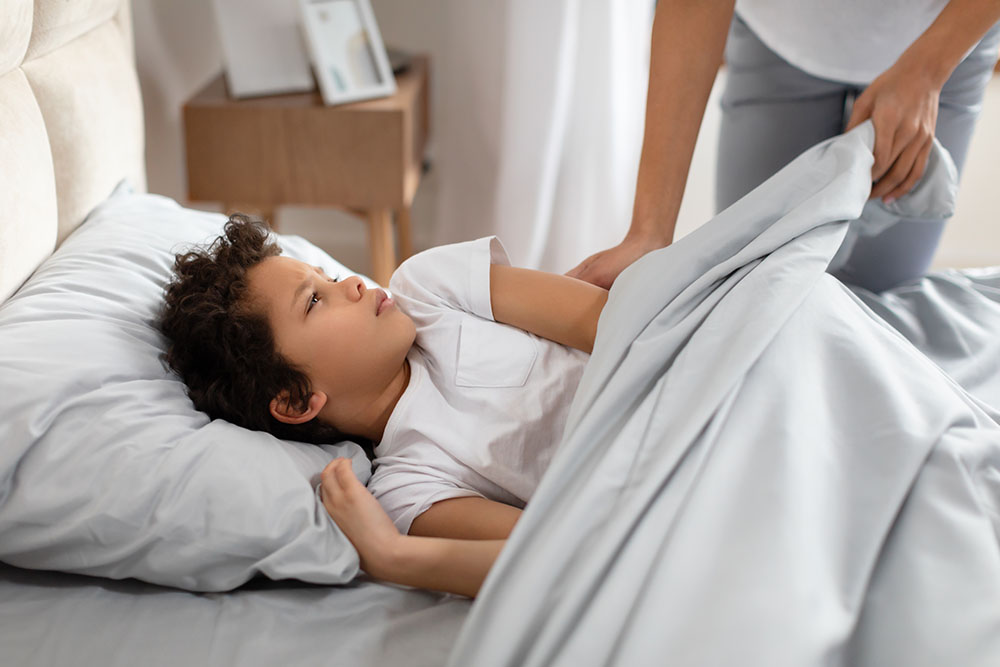Bedwetting, medically known as nocturnal enuresis, is a common issue many children experience during their early years. While it can be a source of concern and frustration for both parents and children, understanding the causes, prevention strategies, and treatment options can alleviate some of the worries and help manage this condition effectively.
Why Do Kids Wet the Bed?
Bedwetting occurs in children for various reasons, and it’s often a normal part of development. Most children achieve nighttime bladder control between the ages of 5 and 7, but bedwetting can persist beyond this age.
Several factors contribute to kids wetting the bed:
- Bladder Overactivity: Some children have smaller functional bladder capacity making it more likely for them to have uncontrolled bladder spasms at lower volumes
- Deep Sleep: Children who are deep sleepers may not wake up when their bladder is full, leading to involuntary urination.
- Genetics: Wetting the bed often runs in families. If a child’s parents experienced bedwetting, there is a higher likelihood the child will too.
- Hormonal Factors: The body produces an anti-diuretic hormone (ADH) that reduces urine production at night. In some children, the production of ADH may be delayed, leading to increased urine production during sleep.
What Causes Bedwetting?
Bedwetting often resolves spontaneously but certain factors can exacerbate or prolong it:
- Stress and Anxiety: Major life changes, such as starting school, moving to a new home, or the arrival of a new sibling, can trigger bedwetting in children who previously had dry nights.
- Medical Conditions: While less common, underlying medical conditions such as urinary tract infections (UTIs), diabetes, or sleep disorders like obstructive sleep apnea can cause bedwetting. If bedwetting starts suddenly after a period of dryness, it’s essential to consult a healthcare provider.
- Constipation: Chronic constipation or rectal holding is a leading cause of bedwetting due to both mechanical (pushing against the bladder) and neurologic means
- Consumption of bladder irritants: Beverages containing caffeine and other bladder sensitizing foods (spicy, acidic, may contribute to bedwetting even if they are not consumed close to bedtime.
Tips to Prevent Bedwetting
Preventing bedwetting involves a combination of behavioral strategies and lifestyle adjustments. Here are some tips that may help reduce or eliminate bedwetting episodes:
- Establish a Regular Bathroom Routine: Encourage your child to use the bathroom regularly during the day and right before bed to ensure the bladder is empty.
- Promote good bowel habits: Encourage your child to take plenty of oral fiber (or fiber equivalent stool softener) and empty their bowels regularly, particularly right before bedtime.
- Limit Fluid Intake Before Bed: Increase morning fluid intake and reduce your child’s drinking in the evening, particularly two to three hours before bedtime. Be mindful not to restrict fluids excessively throughout the day.
- Create a Bedwetting Calendar: A calendar can help track dry and wet nights, and you can use it to celebrate progress. Positive reinforcement can motivate your child.
- Use Protective Bedding: Waterproof mattress protectors and absorbent pads can reduce the stress associated with wetting the bed by making clean-up easier.
- Consider a Bedwetting Alarm: These alarms detect moisture and sound an alert, helping the child wake up and use the bathroom. With consistent use, they can condition the child to recognize the need to urinate during sleep.
When to Be Concerned About Bedwetting?
While bedwetting is usually a harmless condition, there are certain instances when you should seek medical advice:
- Age Consideration: If your child continues to wet the bed beyond the age of 5, it may be time to consult a healthcare professional. Generally, it’s advisable to seek treatment when your child begins to be concerned about wetting the bed and is ready to make consistent dietary and functional changes. This often occurs when your child expresses a desire to participate in sleepovers or overnight camps.
- Sudden Onset: If bedwetting begins suddenly after a long period of dryness, it could be a sign of an underlying medical condition.
- Daytime Wetting: If your child also experiences daytime accidents, it may indicate a more significant issue requiring evaluation.
- Other Symptoms: The presence of symptoms such as pain during urination, excessive thirst, or unusual fatigue warrants further investigation by a doctor.
What Type of Doctor Typically Treats Bedwetting?
Bedwetting is typically managed by a pediatrician, who can evaluate your child’s overall health and development. If further evaluation or specialized care is needed, a pediatric urologist may be consulted. These specialists focus on urinary tract issues in children and can offer more targeted treatment options.
If you are in Tucson and need specialized care, AZ Pediatric Surgery & Urology can provide the expertise required to address persistent bedwetting issues.

